Thailand: BoT blames easy loans for household debt woes
Zero-interest unsecured loans and online shopping are blamed for the country’s swelling household debt, says the Bank of Thailand’s chief.
Previous administrations’ tax rebates for first-time car buyers, financial institutions’ promotional campaigns, and changing consumer behaviour in the digital era are also factors spurring retail loan demand and debt accumulation, said central bank governor Veerathai Santiprabhob.
“Previously, we thought competition between financial institutions for consumer loans would give consumers access to funding sources, attracting them to formal lending and away from loan sharks. But it has led to high household debt,” he said.
Changing lifestyles and consumer financial behaviour, especially for younger segments, has increased the family debt load at a rapid pace. For instance, first-time workers are offered credit cards with no interest charges for the first six months for overseas travel, leading to high levels of debt, said Mr Veerathai.
Online shopping is another factor leading to higher use of inessential loans, exacerbated by easiness and convenience, he said.
Mr Veerathai’s comments underscored the central bank’s concern about high household leverage.
The Bank of Thailand has implemented a series of measures to reduce household debt, starting from tightening regulations for credit card and personal loans in 2017, new loan-to-value regulations supervising mortgage lending in April 2019, and the latest measures for car title loans.
Thailand has one of the highest household debt loads in Asia. The ratio ticked up to 78.7% of GDP at the end of March from 78.6% at the end of last year and 53.5% in early 2009.
Predee Daochai, chairman of the Thai Bankers’ Association (TBA), said the association agreed to slow promotional campaign launches of unsecured loans for inessential purposes, in line with the central bank’s lending directives.
Such campaigns include a specific-period zero-rate credit card or personal loan.
The TBA does not set specific directions to be enforced on commercial banks and leaves business strategy decisions to individual banks. Some commercial banks have already enforced the agreement.
“The zero-rate campaigns, however, would be largely prohibited for inessential loans, depending on loan analysis,” he said.
The TBA, in collaboration with the central bank, has signed a memorandum of understanding on responsible lending under a sustainable banking project last month.
Thanyalak Vacharachaisurapol, deputy managing director at Kasikorn Research Center, said the non-performing loan (NPL) ratio of the overall banking industry is expected to continue rising in the third quarter of the year to above 3%, mainly due to auto loans and mortgages.
Vehicle and housing loans grew significantly last year to the first half of this year before the central bank applied tougher regulations.
The sluggish economy has dampened the debt repayment ability of borrowers, she said.
The time lag for loans turning sour is typically six months in tough economic times, but the central bank’s tougher regulations to control retail loans’ quality and a delay in adopting a standardised debt-service ratio should help keep a lid on the industry’s distressed loans, said Ms Thanyalak.
She said banks’ NPLs are expected to decline marginally to below 3% in the final quarter, given the seasonal factor for bad asset divestment.
Source: https://www.bangkokpost.com/business/1751604/bot-blames-easy-loans-for-household-debt-woes


 English
English




